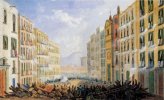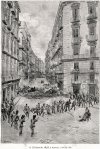"Something is Rotten in the State of Naples"
Napoli, 23 April 1848
"From time to time, two problems manage to solve each other" Leopoldo di Borbone mused looking out towards the magnificent gardens of the Villa Reale of Capua "My brother Ferdinando needed some convincing, before seeing reason, but now he is off to Gaeta to celebrate Easter with His Exiled Holiness and at least I am free of his continuous lamentations and accusations, for a time at least. Today I can take my nephew Francesco for a ride: he will be happy to be away from his bully of a half-brother for a few hours, and I will have an opportunity to start dropping some seeds in his mind. Francesco may not be the best foundation stone on which to build the future of the dynasty, but at least he appears to be intelligent and studious enough, and his age makes him pliable. There will be time enough to help him grow a backbone, the more so if I can keep him from the coterie of priests on whom his step-mother dotes."
Gaeta, 23 April 1848
Ferdinando di Borbone had been very angry when he got the news that the Pope had fled Rome's insurrection, and almost casually ended up in Gaeta, but his anger had not lasted long. He was a dutiful son of Holy Church, and he felt guilty for having criticized the decision of His Holiness, even if it had happened in private and only his brother Leopoldo had been present. Now he felt better for having taken Leopoldo's advice to go to Gaeta and personally greet the Pope. Pio IX was a great and holy man, there was no doubt about that, and he felt honored that the Pope had chosen to search protection from the Jacobins by taking refuge in Gaeta. His Holiness had assured him that it would be for a short time only, and he would leave Gaeta soon to avoid creating additional troubles for the kingdom of Two Sicilies, but Ferdinando had rushed to convince him that the presence of the Pope would be a blessing, rather than an aggravation, and that His Holiness was welcome to stay in the kingdom as long as he needed or wished.
Ferdinando almost choked on his words when he was forced to admit that for the time being there was no possibility to send Neapolitan troops to castigate the revolutionaries and take back Rome for the Holy Father: the unrest in Naples, the insurrections in Abruzzi and Calabria, as well as the the secession of Sicily forced him to wait before committing to such an undertaking, but soon the swords of the Kingdom of Two Sicilies would be drawn in defense of the Temporal Power of the Pope: just give time to the political horizon to clear a bit. Ferdinando's eyes became a bit moist, remembering how in the end His Holiness had relented, and promised to remain in Gaeta, under the protection of the House of Borbone.
Napoli, 7 May 1848
Carlo Troya, Prime Minister of the kingdom of Two Sicilies since the beginning of April, had been summoned to the Royal Palace in Naples to report on the riots which had happened the day before, during the ceremonies for the feast of San Gennaro: the blood of the saint had failed to liquefy, always a bad omen for the populace of Naples, and the lazzaroni had rioted. It had not been much of a riot, and the Guardia Nazionale had easily kept it under control, but the king was clearly upset by the news. Carlo Troya was pretty sure that the riot found its roots more in the failure on the part of the king to distribute the traditional Easter donations to the poorest classes, rather than in the botched miracle, but it was pretty clear that the king would not have been willing to listen to any such explanation: the summon had been made to allow Ferdinando to vent his dissatisfaction on his hapless Prime Minister, after all.
Another sore point which came up during the discussion was the planned inauguration of the first Constitutional Parliament : it would happen on 15 May, barely a week away, but the king had been very reluctant to discuss any of the still unsolved issues. The first elections to the Lower House of Parliament had returned a clear majority for liberals and democrats, to the chgrin of the king, and there were rumors in plenty that the elected Representatives were not going to accept without protest the constitutional set-up granted by Ferdinando on 29 January 1848, since it gave the king and the House of Peers a clear upper hand in all legislative matters. Carlo Troya wished to reach a compromise before the inauguration, but for the time being neither the king nor the elected Representatives would budge from their positions.
Napoli, 11 May 1848
The Representatives, spurred by the Mazzinians among them (1), had declared that the oath of allegiance to king and constitution had to make clear that the Lower House was entitled to discuss and vote whichever modification to the Constitution they required necessary. It was not something the king would be willing to accept, and just four days prior to the planned inauguration the stalemate was continuing.
Napoli, 12 May 1848
To further complicate the issue, the king released on Friday the list of the Peers appointed to the Upper House: there was no more than a handful of liberals among them, and the powers given to the Peers were the most important issue the Representatives wanted to modify.
The Representatives already arrived in Naples retaliated by sitting in assembly in the Convent of Monte Oliveto (the Parliament would be convened in the nearby church of San Lorenzo). While different formulations of the oath of allegiance were exchanged between the government and the rump parliament, the Representatives also voted a motion, to be sent to the Government, asking that no troops would be allowed in the city on Inauguration Day, that the Guardia Nazionale would be responsible for keeping law and order and also that the city's strongpoints should be handed over to the same Guardia Nazionale.
The confrontation continued over Saturday and Sunday, without reaching any common ground.
A compromise version of the oath of allegiance was finally, and grudgingly, agreed during the night between 14 and 15 May, but at this point in time wild rumors were abounding all over the city, and the first barricades were already in place.
Napoli, 15 May 1848
The first act of Parliament was to send a proclamation to the Guardia Nazionale, thanking them for defending constitutional liberties but also asking to dismantle the barricades. It was not obeyed: no barricade was dismantled, and the Guardia Nazionale was conspicuously manning them.
The tense confrontation abruptly erupted into fighting around 10 in the morning.
Two Representatives, sent to the Royal Palace to further negotiate, were arrested. A little later, field guns were moved to the esplanade in front of the Royal Palace, and two officers were sent to negotiate the removal of the large barricade in Via Toledo, near to Palazzo Cirella: they were shot while approaching the insurgents, and all hell came loose Field artillery was rolled forward to cannonade the barricades, and the Swiss mercenary regiments were sent to clear the streets. The fighting raged for most of the day, initially concentrated around Palazzo Cirella (it belonged to the Catalano Gonzaga(2), who were strongly leaning toward the liberals): after a short but vicious siege, the doors were broken, and the enraged soldiery sacked the palace, killing all armed people. Then the fight spread to the old city, barricade after barricade falling under the assaults and the volleys of the Swiss companies. The last act was the attack against the convent of Monte Oliveto, where the Representatives had repaired. The convent was cannonaded, before an ultimatum was delivered: Parliament had been dissolved by the king, and all the people holed up in the convent were ordered to surrender. Just a few die-hards chose to stand to the last man, and most of the Representatives bowed to the ultimatum. The fight was almost over, even if during the night bands of lazzaroni sacked the houses of known liberals.
At sundown, Carlo Troya brought to the king the news that the order had been restored, and offered the resignation of his government : it was refused
Leopoldo, count of Siracusa, was watching the fighting from a tower of the Royal Palace: he stood there for hours, without moving, an inscrutable expression on his face. Finally he left, murmuring: “The tree of liberty must be refreshed from time to time with the blood of patriots and tyrants. It is its natural manure. (5)”
Gen. Guglielmo Pepe had refused the command of the operations to clear the barricades, and had managed to keep most of the Neapolitan regiments on the side lines (he wrote in his diary the following lines: "I respectfully pointed out to the king that the Neapolitan regiments might balk at the order to fire on fellow Neapolitans, and they were better kept to ensure the safety of the Royal Palace. Quite true, but I should have led these regiments to fight for freedom, and I failed to do so: this stain will always mar my honor as a soldier."
The troops sent to restore order were commanded by gen. Raffaele Carrascosa, a notorious reactionary and a sworn enemy of Pepe, and only the Swiss regiments were tasked with assaulting the barricades, supported by the field artillery.
Napoli, 16 May 1848
King Ferdinando sacked Troya (3), and charged Gennaro Spinelli Barile (4), principe di Cariati, with the task of forming a new ministry.
Footnotes
- The most outspoken Mazzinians were Giovanni La Cecilia and Pietro Mileti. The latter after the failure of the insurrection, went to Calabria to foment a revolt there: he died in battle in July 1848. The former also managed to escape Naples, and went in exile to England and France. He never managed to gain any importance among the patriots, and Cavour had a very poor opinion not just of his political skills but also of his personal honesty.
- Don Pasquale Catalano Gonzaga, duke of Cirelli, his two sons, Luigi and Clemente, and his brother Pietro were captured, and imprisoned on a ship in the harbor. They managed to escape, with the help of Guglielmo Pepe, and to reach Rome. They will play a role in the future events in Naples.
- When Ferdinando di Borbone sacked Carlo Troya, he added "Now you're free to go back to the Middle Ages" (Carlo Troya was a well known historian). Guglielmo Pepe wrote in his diary: "Yesterday Troya was an acceptable and worthy prime minister, and today he is discarded with unkind words and a sneer: after the death and destruction waged on the city of Naples and its poor citizens, I cannot but think that something is rotten in the state of Naples".
- Gennaro Spinelli Barile was a courteous and well educated nobleman, but never amounted to much in politics, given his well-known mediocrity: he was born to be a puppet and a lackey, not a puppet-master..
- A quote by Thomas Jefferson



